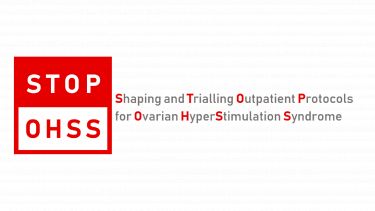STOP-OHSS study
Shaping and Trialling Outpatient Protocols for Ovarian HyperStimulation Syndrome.

A feasibility study and randomised controlled trial, with an internal pilot, to assess the clinical and cost-effectiveness of earlier active management of OHSS.
This study is funded by the National Institute for Health Research (NIHR) Health Technology Assessment Programme (NIHR128137). The views expressed are those of the author(s) and not necessarily those of the NIHR or the Department of Health and Social Care.
Background
Ovarian hyperstimulation syndrome (OHSS) is a side-effect of assisted reproductive treatments (ARTs) and is caused by overstimulation of the ovaries, resulting in fluid retention in the abdomen (ascites), dehydration and in critical cases, respiratory distress and disturbed renal and liver functions.
OHSS can be classified as early or late. Early OHSS is caused by the ovarian stimulation drugs given during ARTs and occurs usually within 7 days after the final drug (hCG) is given. Late OHSS usually occurs 10 days or more after the administration of hCG and is caused by endogenous hCG of a resulting pregnancy.
Currently, treatment is only usually provided once OHSS has progressed to a severe state and the patient requires intensive inpatient treatment. Prior to this, patients are monitored and provided with medication and advice to enable rehydration. In uncontrolled, small studies, paracentesis (drainage of the ascites) provided in the outpatient setting has been shown to prevent the need for hospitalisation if administered soon after OHSS develops; this needs to be confirmed by high quality trials.
Read the study protocol v4 (Word doc, 971KB)
The study
The study aims to establish the clinical and cost-effectiveness, safety, and acceptability of outpatient paracentesis (OP) as an active management for women with moderate or severe OHSS, in a multi-centre adaptive randomised controlled trial (RCT) with internal pilot to assess the feasibility of conducting the RCT.
In phase 1, qualitative interviews were undertaken with clinicians and patients to explore the feasibility and acceptability of the earlier active management protocols and RCTs. The results of these interviews were fed back to clinicians during a consensus event in order to confirm protocols. In parallel, a retrospective review of patient notes was undertaken at the proposed RCT centres in order to validate the parameters used for the RCTs.
In phase 2, the study will undergo a pragmatic, two-arm, parallel-group, adaptive, open label, superiority, confirmatory, group sequential, individual RCT with one interim analysis for futility early stopping. A total of 224 women with moderate or severe (early or late) OHSS will be randomised to the trial. The women will be undergoing In vitro fertilisation (IVF) including intracytoplasmic sperm injection (ICSI) and intrauterine insemination (IUI). Participants will be randomised (1:1) to receive outpatient paracentesis (OP) plus increased self-monitoring, or conservative management (usual care). The primary outcome measure will be OHSS related hospitalisations for at least 24 hours within 28 days of randomisation.
The trial will include an internal pilot after 15 months of recruitment to assess the feasibility of conducting the RCT. An interim analysis will be performed for futility early stopping when 65% (73 per arm) of the maximum required participants have accrued primary outcome data on hospitalisation.
Study team
|
Name |
Role |
Organisation |
Contact |
|
Mostafa Metwally |
Chief Investigator |
91Ě˝»¨ Teaching Hospitals |
|
|
CTRU Lead |
University of 91Ě˝»¨ |
||
|
Study Manager |
University of 91Ě˝»¨ |
||
|
Clare Pye |
Lead Research Nurse |
91Ě˝»¨ Teaching Hospitals |
|
|
Statistician |
University of 91Ě˝»¨ |
||
|
Lead Health Economist |
University of 91Ě˝»¨ |
||
|
Health Economist |
University of 91Ě˝»¨ |
||
|
Head of Data Management |
University of 91Ě˝»¨ |
||
|
Data Manager |
University of 91Ě˝»¨ |
||
|
Lead Qualitative Researcher |
University of 91Ě˝»¨ |
||
|
Qualitative Researcher |
University of 91Ě˝»¨ |
||
|
Raj Mather |
Clinical Expertise |
Manchester University NHS Foundation Trust |
|
|
Clinical Expertise |
Liverpool Women's NHS Foundation Trust |
||
|
Clinical Expertise |
University of Southampton |
||
|
Angela Pinder |
Sponsor Representative |
91Ě˝»¨ Teaching Hospitals |
|
| George Cleaver | Trials Support Officer | University of 91Ě˝»¨ | g.j.cleaver@sheffield.ac.uk |

